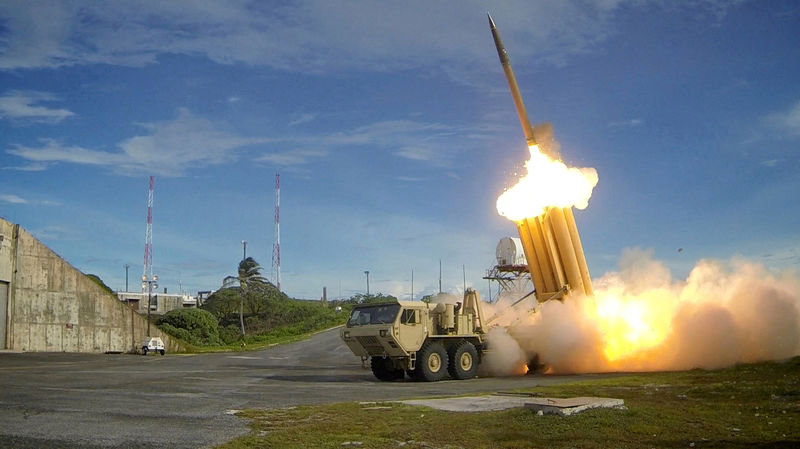BEIJING (Reuters) - China reiterated its opposition on Thursday to the U.S. deployment of an anti-missile system in South Korea, after Seoul said it would hold off on installing remaining components until it completes an assessment of the system's environmental impact.
The move could mean substantial delays in a full deployment of the Terminal High Altitude Area Defence (THAAD) system in South Korea, as the environmental review may take well over a year, according to a senior official at the presidential Blue House.
During his successful election campaign, President Moon Jae-in had pledged to review the previous South Korean government's decision to deploy THAAD, saying that the deployment was rushed without assessing its environmental impact or seeking parliamentary approval.
On Wednesday, Moon's office said installation of four additional launchers would be halted until an assessment of the system's impact on the environment was completed.
China, along with Russia, has repeatedly expressed opposition to the THAAD deployment, saying it will do nothing to help ease tensions with North Korea.
Beijing also fears THAAD's powerful radar system can look deep into China, threatening its own security.
Speaking at a daily news briefing, Chinese Foreign Ministry spokeswoman Hua Chunying reiterated that China's opposition to the deployment of THAAD was clear and consistent.
"We have said many times before that the United States deployment of THAAD not only is not beneficial for the resolution of the Korean Peninsula nuclear issue, it is also not good for regional stability," she said.
"On this issue, China and Russia are agreed and have common interests. Of course China and Russia will continue to closely communicate on this issue, we will oppose the United States deploying THAAD in South Korea."
Russian President Vladimir Putin said last week that elements of U.S. anti-missile systems in Alaska and South Korea were a challenge to Russia and that Moscow had no choice but to build up its own forces in response.
Putin said the Kurile Islands, a chain of islands in the Far East where Russia and Japan have rival territorial claims, were "quite a convenient place" to deploy Russian military hardware to respond to such threats.
The introduction of the THAAD system has sparked protests in South Korea and a backlash in China against South Korean business interests.
The Global Times, published by China's official People's Daily, however said that no matter the outcome of the environmental study, South Korea's announcement could reduce tensions.
"Moon is more rational on THAAD than former President Park Geun-hye, which can benefit future China-South Korea relations," the newspaper said in an editorial. "No matter the outcome, that the Blue House announced a suspension in the deployment of THAAD can help reduce friction with China."
But it added: "However, attitude is not everything. Without solving the problem of THAAD, the pain it has brought to bilateral relations will not disappear, and South Korea must swallow some of the bitter results."

China should work with Russia on counter-measures to THAAD, the Global Times added.